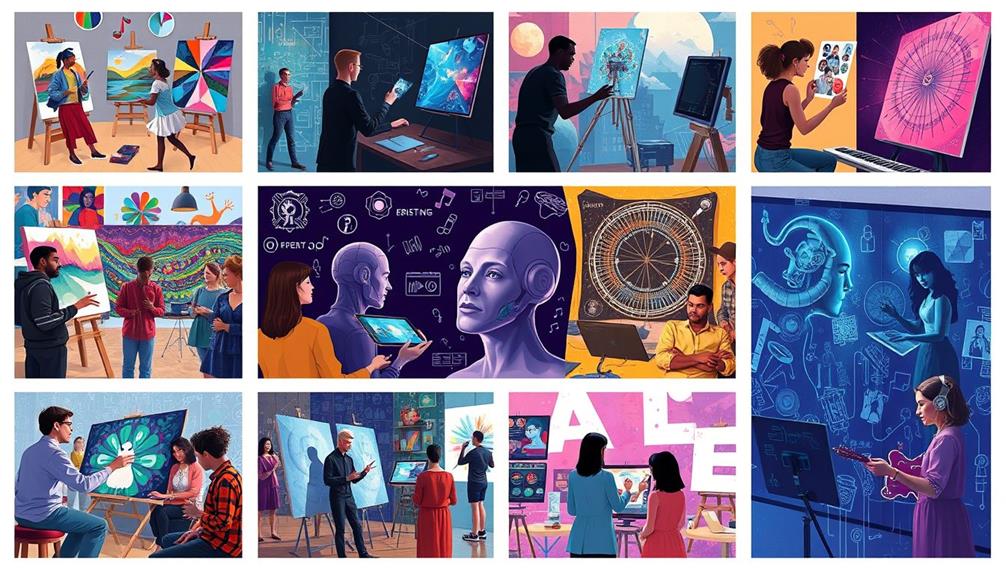AI News
Mysterious AI Systems: A Threat or Innovation

As we step into the realm of artificial intelligence, we find ourselves in a mysterious landscape, shrouded in secrecy. The inner workings of these advanced AI systems remain hidden, leaving us questioning their potential as threats or innovations.
With reports of limited transparency, concerns arise about the risks and benefits these systems bring. In this article, we explore the need for openness in AI, examining the impacts and potential benefits, to determine if these enigmatic systems hold true innovation or pose a threat.
Join us on this journey of discovery.
Key Takeaways
- Lack of transparency in AI systems and models hinders scientific advances, accountability, reliability, and safety.
- Openness in AI can lead to significant advancements in the field and promote a scientific discipline rather than a profit-driven industry.
- More openness in AI, including access to data and algorithms, is crucial for reproducibility and scientific advancement.
- Transparency in AI systems builds trust, fosters collaboration and innovation, and allows for the identification and mitigation of biases and ethical concerns.
Lack of Transparency in AI Systems
Lack of transparency in AI systems poses significant concerns in terms of accountability, reliability, and safety.

Secrecy in AI research and the lack of transparency and accountability in AI development hinder the progress of scientific advancements.
Companies like OpenAI, for example, withhold information about training data and algorithms, which not only prevents misuse but also gives competitors an unfair advantage.
A recent report from Stanford University highlights the deep secrecy surrounding AI systems such as GPT-4. The report suggests that models can become more open without sacrificing competitiveness.
More openness in AI is crucial for the scientific discipline to thrive and avoid becoming solely profit-driven. It enables reproducibility, collaboration, and innovation, while also addressing concerns related to biases and ethical considerations.

Ultimately, transparency in AI systems is necessary for responsible and accountable development and deployment.
Impact on Scientific Discipline
With its lack of transparency, AI systems have the potential to undermine the scientific discipline and hinder its progress. The impact on scientific discipline is significant, as it faces challenges in maintaining transparency and accountability in AI development.
Here are three key ways in which AI systems affect the scientific discipline:
- Scientific Advancement: Lack of transparency in AI models hampers scientific advances by limiting reproducibility and hindering collaboration. Open access to data behind AI models is crucial for scientific progress.
- Reliability and Safety: Without transparency, it becomes difficult to ensure the reliability and safety of AI systems. Transparency facilitates the identification and mitigation of biases and ethical concerns, leading to responsible and accountable development.
- Profit-driven Approach: The secrecy surrounding AI systems risks transforming the field into a profit-driven industry rather than a scientific discipline. Openness in AI is necessary to prevent a closed and proprietary situation that stifles innovation.
To overcome these challenges, it’s essential to prioritize transparency and accountability in AI development to safeguard the integrity of the scientific discipline.

Need for Openness in AI
Openness is crucial in the development of AI systems. It’s essential to address the challenges that arise from the lack of transparency in AI. The ethical implications of secretive AI systems can have far-reaching consequences. Without openness, it becomes difficult to ensure accountability, reliability, and safety.
Transparency in AI models and algorithms allows for better understanding and evaluation of their capabilities and limitations. It also fosters collaboration and innovation by enabling public access to AI model data.
More importantly, openness in AI can help identify and mitigate biases and ethical concerns. By promoting responsible and accountable development and deployment, openness in AI ensures that the technology serves the best interests of society.
Potential Benefits of Transparency
Promoting transparency in AI systems brings forth significant benefits in building trust, understanding capabilities, and fostering collaboration. Here are three key advantages of transparency in AI:

- Improving accountability: Transparency allows users and stakeholders to hold AI systems accountable for their actions. By providing visibility into the inner workings of AI models and algorithms, we can better understand how decisions are made, identify biases, and ensure that AI systems are fair and unbiased.
- Collaborative innovation: Openness and transparency enable collaboration among researchers, developers, and users. When AI systems are transparent, it becomes easier to share knowledge, exchange ideas, and collectively work towards improving the technology. This fosters innovation and accelerates the development of responsible and ethical AI solutions.
- Ethical considerations: Transparency in AI systems facilitates the identification and mitigation of biases, discriminatory practices, and other ethical concerns. By exposing the underlying data and algorithms, we can ensure that AI systems are aligned with societal values and respect individual rights. This helps to build a more inclusive and equitable AI ecosystem.
Concerns and Impacts of AI Development
One major concern of AI development is the potential impact on privacy and targeted advertising. As AI systems become more advanced, there’s a growing risk of invasion of privacy. These systems have access to vast amounts of personal data, which can be used to target individuals with personalized advertisements. This raises concerns about the misuse of personal information and the erosion of privacy rights.
Additionally, the impact of AI on the job market is another significant concern. As AI technologies automate tasks traditionally performed by humans, there’s a fear of job displacement and unemployment. It’s important to carefully consider the ethical and societal implications of AI development to ensure that privacy rights are protected and the job market isn’t adversely affected.
Role of WIRED in Technology Advancements
WIRED plays a pivotal role in driving technology advancements and fostering innovation in the field of AI. With its influential platform and responsible technology reporting, WIRED has a significant impact on shaping the future of AI.
Here are three ways WIRED’s influence positively contributes to the advancements in AI:

- In-depth coverage: WIRED explores the impact of AI on various aspects of life, providing insightful and comprehensive coverage that helps readers understand the potential of AI and its implications.
- Uncovering breakthroughs: WIRED uncovers and highlights the latest breakthroughs and innovations in AI, showcasing the cutting-edge research and advancements that push the boundaries of what AI can achieve.
- Responsible reporting: WIRED ensures responsible use of information, protecting users’ privacy rights while promoting transparency and ethical considerations in AI development. By providing unbiased and accurate reporting, WIRED fosters a culture of responsible technology adoption.
Through its influence and commitment to responsible technology reporting, WIRED plays a vital role in advancing AI and shaping a future where technology is used responsibly and for the benefit of humanity.
Secrecy in Training Data and Algorithms
The lack of transparency in AI systems and models raises concerns about the training data and algorithms used. This secrecy has ethical implications and provides companies with a competitive advantage. By withholding information about their training data and algorithms, companies like OpenAI are able to prevent misuse and maintain an edge over their competitors.
However, this lack of transparency reduces scientific advances, accountability, reliability, and safety. A recent Stanford University report revealed deep secrecy surrounding AI systems like GPT-4, with none of the assessed models achieving more than 54% transparency across all criteria.
It’s important to consider how models could become more open without losing their competitive edge, as increased transparency in AI can address concerns regarding ethical implications and promote responsible and accountable development and deployment.

Reduction in Scientific Advances
Our understanding of AI systems and their potential for scientific advancements is hindered by the lack of transparency in their training data and algorithms. This reduction in transparency and collaboration inhibits research and limits the progress of scientific disciplines.
Here are three key points to consider:
- Reduction in research: A lack of transparency in AI systems restricts access to crucial information, hindering researchers from studying and building upon existing models. This reduction in research opportunities stifles scientific advancement and limits the potential for groundbreaking discoveries.
- Lack of collaboration: Without transparency, collaboration between different research teams becomes difficult. The absence of shared knowledge and open access to data inhibits the collective effort to solve complex problems. Collaboration fosters innovation and accelerates scientific advancements, making it crucial for AI systems to promote openness and collaboration.
- Implications for scientific progress: The secrecy surrounding AI systems creates a closed and proprietary environment. This hampers the exchange of ideas, slows down the pace of scientific progress, and limits the benefits that society can derive from AI technologies. Embracing transparency and fostering collaboration would enable responsible and accountable development, leading to more significant scientific advances.
Openness in Late 2010s
In the late 2010s, we witnessed a significant shift towards openness in the field of AI. Openness in AI has become a catalyst for innovation, driving advancements and pushing boundaries. It has also brought ethical considerations to the forefront of AI development.
| Openness in AI: Catalyst for Innovation | Ethical Considerations in AI Development | Benefits of Openness |
|---|---|---|
| Encourages collaboration and knowledge sharing | Addresses biases and promotes fairness | Builds trust and transparency |
| Fosters reproducibility and scientific advancement | Mitigates ethical concerns | Enables better understanding of AI models |
| Drives responsible and accountable development | Ensures accountability and reliability | Facilitates identification and mitigation of biases |
This shift towards openness has allowed for a more responsible and accountable approach to AI. By sharing data, algorithms, and models, the AI community can work together to ensure the ethical development and deployment of AI systems. Openness not only fosters innovation but also builds trust and transparency, crucial elements for a society that values freedom and progress.

Widening Access to Data
Widening access to data allows us to harness the power of AI in a more responsible and collaborative manner. Here are three key reasons why data accessibility is crucial for collaborative innovation in AI:
- Fostering diversity and inclusivity: When data is accessible to a broader range of individuals and organizations, it promotes diversity in AI development. This inclusivity leads to a wider representation of perspectives and experiences, resulting in more comprehensive and unbiased AI systems.
- Accelerating scientific advancements: Open access to data behind AI models enables reproducibility and encourages scientific advancement. When researchers and developers have access to data, they can build upon existing models, refine algorithms, and push the boundaries of AI capabilities.
- Fueling innovation and collaboration: Public access to AI model data facilitates collaboration among researchers, developers, and stakeholders. By sharing data, ideas, and insights, a collaborative environment is created where innovations can flourish. This collaborative approach accelerates the development and deployment of responsible AI systems.
AI Models and Danger
With AI models becoming increasingly sophisticated and pervasive, understanding the potential dangers they pose is essential for responsible and accountable development. The ethical implications and privacy concerns surrounding AI models have become major points of discussion.
As these models are deployed in various industries, there’s a growing need to address the potential risks they present. One of the main concerns is the lack of transparency in AI systems and models, which can hinder scientific advances, accountability, reliability, and safety. Companies like OpenAI have been criticized for their lack of transparency regarding training data and algorithms. This lack of openness also raises concerns about the potential for misuse and the preservation of competitors’ advantage.
Additionally, the rise of AI chatbots, such as ChatGPT, raises privacy concerns and the potential for targeted advertising. Understanding these ethical implications and privacy concerns is crucial in order to mitigate the risks associated with AI models and ensure responsible development.

Trust and Understanding in AI Systems
To foster trust and understanding in AI systems, we must prioritize transparency and open access to crucial information. Building trust in AI is essential for its responsible development and deployment.
Here are three key reasons why transparency is crucial:
- Ethical implications: AI systems have the potential to impact our lives in profound ways. Transparency ensures that these systems are developed and used ethically, addressing concerns related to biases, discrimination, and privacy.
- Accountability: Openness in AI allows for greater accountability. By making the inner workings of AI systems accessible, we can identify and address any issues or biases that may arise, ensuring that AI is used in a fair and responsible manner.
- Public understanding: Transparency enables better understanding of AI systems’ capabilities and limitations. It empowers users and stakeholders to make informed decisions, fostering a sense of trust in AI technologies.
Frequently Asked Questions
How Does the Lack of Transparency in AI Systems Impact Scientific Advancements?
The lack of transparency in AI systems hinders scientific advancements by limiting accountability and ethical considerations. It is essential to address these concerns in order to ensure responsible and accountable development in the field of AI.
What Are the Potential Benefits of Transparency in AI Systems?
Transparency in AI systems benefits society by fostering trust, enabling collaboration, and promoting responsible development. Ethical implications are addressed, and societal concerns, like privacy and bias, can be identified and mitigated.

What Are the Concerns and Impacts of AI Development, Specifically in Relation to Chatbots?
Ethical implications of AI development, specifically in relation to chatbots, include concerns about privacy, targeted advertising, and misinformation. These issues can impact user trust and the reliability of web search results.
How Does WIRED Contribute to Technology Advancements and the Field of Ai?
Wired contributes to technology advancements by providing insightful coverage of AI ethics. Their objective and analytical approach ensures responsible use of information, protecting users’ privacy rights while exploring breakthroughs and challenges in the field.
How Does the Secrecy Surrounding TrAIning Data and Algorithms Affect AI Models and Their Potential for Scientific Advances?
Secrecy implications in AI models hinder scientific advances and innovation. Lack of transparency in training data and algorithms limits accountability and reliability. Algorithmic bias remains unchecked without open access to crucial information.
Conclusion
In conclusion, the lack of transparency in AI systems poses significant risks and hinders scientific advancement. However, there’s hope for change as experts argue that more openness in AI can lead to significant benefits.

By embracing transparency, we can ensure accountability, reliability, and safety in AI development.
It’s crucial to navigate the enigmatic world of AI with a focus on responsible use of information and the pursuit of true innovation.
Hanna is the Editor in Chief at AI Smasher and is deeply passionate about AI and technology journalism. With a computer science background and a talent for storytelling, she effectively communicates complex AI topics to a broad audience. Committed to high editorial standards, Hanna also mentors young tech journalists. Outside her role, she stays updated in the AI field by attending conferences and engaging in think tanks. Hanna is open to connections.
AI News
AI-Driven Innovations in Waste Management: Environmental Education and Sustainability
You’ll discover how AI innovations in waste management can revolutionize sustainability and community engagement, but what surprising benefits await?

AI-driven innovations are transforming waste management and enhancing your understanding of sustainability. By using smart bins with IoT sensors, communities can monitor waste levels in real-time, optimizing collection schedules and reducing costs. Machine learning algorithms improve sorting accuracy, increasing recycling rates and lowering contamination. These technologies promote a circular economy by encouraging reuse and recycling, while educational programs raise awareness of sustainable practices. Engaging in these initiatives not only boosts community involvement but also supports environmental education. If you explore further, you'll uncover more about the exciting future AI holds for waste management and sustainability.
Key Takeaways
- AI technologies enhance waste sorting accuracy, improving recycling quality and encouraging community participation in sustainable practices through educational initiatives.
- Smart bins equipped with IoT sensors provide real-time monitoring, fostering awareness of waste levels and promoting responsible disposal habits.
- Mobile waste reporting apps empower communities to engage in environmental education, highlighting the importance of proper waste management and accountability.
- Gamification elements within waste management apps encourage participation in sustainability efforts, making environmental education interactive and appealing.
- Predictive analytics help communities understand waste generation patterns, guiding educational campaigns and resource allocation for effective sustainability initiatives.
AI Applications in Waste Management
In the domain of waste management, AI applications are revolutionizing how we handle refuse. You'll find that AI technologies greatly enhance waste sorting efficiency, leading to a remarkable 20% reduction in contamination rates in recycling streams.
The integration of AI software engineers is essential in developing these innovative solutions. By employing machine learning algorithms, you can automate and speed up sorting processes by as much as 30% compared to traditional methods. This not only improves the quality of recycled materials but also boosts recycling revenue by 10-20% through minimized contamination.
Moreover, predictive analytics play a key role in optimizing waste collection routes. This results in a 15% decrease in operational costs for waste management companies, which ultimately benefits both the environment and consumers.
Additionally, IoT-integrated sensors monitor waste bin fill levels in real-time, allowing for dynamic scheduling that can reduce collection frequency by 25%. Together, these advancements contribute greatly to sustainable waste management practices.
Benefits of AI Integration

Numerous benefits arise from integrating AI into waste management systems. You'll notice increased efficiency as AI automates sorting and collection processes, which cuts down operational costs tied to manual labor. Enhanced sorting accuracy means less contamination in recycling streams, improving the quality of recycled materials and boosting revenue for waste management companies. Additionally, key strategies for success in healthy living can also inspire innovative approaches to sustainability in waste management.
Moreover, predictive analytics powered by AI helps optimize waste collection routes. This results in decreased fuel consumption and lower greenhouse gas emissions from waste collection vehicles, positively affecting the environmental impact of your operations.
With the introduction of AI-driven smart bins equipped with IoT sensors, you can monitor waste levels in real-time, allowing for dynamic scheduling of collections that match actual demand.
Additionally, AI technologies improve recovery rates of recyclable materials, contributing to the preservation of natural resources and promoting a circular economy. By embracing AI integration, you're not just enhancing your waste management practices but also playing a crucial role in fostering sustainability and environmental responsibility.
In short, AI isn't just a tool for efficiency; it's a pathway to a greener future.
NANDO: An Innovative Solution

NANDO revolutionizes waste management with its AI-powered platform designed to monitor and analyze waste production for communities and organizations. By providing actionable insights, you can tackle environmental challenges more effectively. The platform's monitoring dashboard aggregates waste data, allowing you to assess environmental impacts and track your waste reduction efforts.
To engage community members, NANDO incorporates gamification strategies that raise awareness and promote active participation in waste reduction initiatives. This approach not only makes sustainability more accessible but also fosters cultural shifts toward better waste management practices.
Here's a quick overview of NANDO's key features:
| Feature | Description |
|---|---|
| AI Monitoring | Tracks waste production and provides insights |
| Dashboard | Visualizes data for easy assessment |
| Gamification | Encourages community engagement and participation |
With NANDO, you're not just adopting AI-driven innovations; you're becoming part of a movement towards sustainability. By integrating these technologies, you can make a significant impact on waste management practices in your community.
Promoting Circular Economy

The concept of a circular economy is transforming how we think about waste and resource management. It emphasizes the reuse, repair, and recycling of materials, which can greatly reduce landfill waste and promote resource conservation.
By integrating AI technologies into waste management systems, you can enhance sorting accuracy, potentially increasing the recovery rate of recyclable materials by 30%. This supports the core principles of the circular economy. Additionally, understanding the importance of regulatory compliance in waste management can further bolster these initiatives.
Moreover, AI can help municipalities decrease waste sent to landfills by up to 50%, aligning perfectly with circular economy goals. Implementing AI-driven predictive analytics in waste collection optimizes resource allocation, reducing truck trips by 20-30%. This not only lowers operational costs but also contributes to better environmental outcomes.
Additionally, the adoption of AI-enabled smart bins allows for real-time monitoring of waste levels, fostering a culture of recycling. When communities actively participate in circular economy initiatives, you create a sustainable environment that benefits everyone.
Future of AI in Sustainability

As you explore the future of AI in sustainability, you'll see how advancements in technology can transform waste management practices.
By leveraging data-driven decisions to enhance operational efficiency, organizations can make informed choices that positively impact the environment.
By embracing collaborative strategies, you can optimize resource management and enhance recycling efforts.
Together, these innovations hold the potential to tackle pressing environmental challenges effectively.
AI Technology Advancements
Innovative AI technologies are set to transform sustainability practices, particularly in the domain of waste management. As advances in artificial intelligence (AI) emerge, they're poised to optimize waste management systems by enhancing sorting and recycling processes.
You'll notice that predictive analytics and automation are becoming essential applications of AI, helping organizations manage resources more efficiently. Moreover, AI's role in revolutionizing education can parallel the educational initiatives for environmental awareness, promoting sustainable practices among communities.
The upcoming AI for Good Global Summit will highlight these innovative AI applications, showcasing how they enhance sustainability efforts. Collaborations, like those with ReLearn, aim to accelerate the implementation of these strategies, especially in regions grappling with significant waste challenges.
By integrating AI into waste management, you can expect higher recycling rates and reduced greenhouse gas emissions linked to material production. These advancements are fundamental for addressing global environmental challenges and fostering circular economies that prioritize waste reduction and resource recovery.
As AI technologies evolve, they'll continue to play a significant role in shaping a more sustainable future. You'll find that embracing these advancements not only benefits the environment but also drives progress in effective waste management practices worldwide.
Sustainable Waste Management Practices
Sustainable waste management practices are increasingly becoming feasible with the help of AI technologies. You can leverage AI solutions to automate sorting processes and optimize waste collection routes, potentially boosting recycling rates by up to 50%.
Regular inspections can prevent leaks and flushing issues in your waste management systems, ensuring they operate smoothly. By implementing smart bin systems equipped with IoT sensors, you can cut waste collection costs by 30% through effective route optimization and real-time monitoring of waste levels.
Moreover, integrating machine learning algorithms allows you to utilize predictive analytics, forecasting waste generation patterns. This helps municipalities allocate resources more efficiently and minimize operational inefficiencies.
AI applications have also shown a remarkable ability to reduce contamination rates in recycling streams by as much as 20%, enhancing the quality and value of recycled materials.
Collaborative Environmental Strategies
Collaborative environmental strategies are reshaping how communities tackle waste management by harnessing AI technologies. These approaches enhance community engagement and foster a culture of sustainability. By leveraging AI-driven predictive analytics, municipalities, businesses, and residents can work together to optimize waste collection and recycling efforts, ultimately reducing waste generation.
| Strategy | AI Application | Community Benefit |
|---|---|---|
| Smart Bins | Automated waste sorting | Improved recycling rates |
| Predictive Analytics | Waste collection planning | Efficient resource allocation |
| Educational Campaigns | Awareness on waste reduction | Increased community involvement |
Partnerships between tech developers and local governments play a vital role in implementing innovative AI solutions. These collaborations streamline waste processes and support circular economy principles. Furthermore, educational campaigns powered by AI raise awareness about sustainable practices, encouraging you and your neighbors to adopt better recycling habits.
The integration of AI in these collaborative strategies promotes data sharing and transparency, ensuring informed decision-making aligns with sustainability goals. By engaging everyone in these initiatives, you can actively contribute to a cleaner, more sustainable community.
Innovations in the USA

In the USA, municipalities increasingly leverage AI technologies to transform waste management practices. With AI-driven optimization, cities are improving waste collection routes, which leads to significant fuel savings and lower operational costs through predictive analytics. This tech allows you to better allocate resources and plan for the country's annual generation of approximately 3.6 million tons of healthcare waste.
Additionally, strategies for sustainable foraging can be integrated into waste management practices, promoting a holistic approach to environmental responsibility.
Automated sorting systems powered by machine learning algorithms enhance waste segregation accuracy, reducing contamination rates and improving the quality of recycled materials. When you visit recycling facilities, you'll see the integration of robotic sorting systems with computer vision, which boosts operational efficiency and minimizes human error, guaranteeing faster processing of recyclables.
Additionally, smart bin technology equipped with IoT sensors enables real-time monitoring of waste levels. This means municipalities can dynamically schedule waste collections, cutting down on unnecessary trips.
Innovations in Africa

In Africa, you'll find mobile waste reporting apps that empower communities to take charge of their waste management efforts.
These tools not only enhance engagement but also foster a sense of local ownership. By integrating these innovations with sustainable practices, communities can improve their resilience against environmental challenges, similar to how RV living for preppers promotes self-sufficiency and resourcefulness.
As you explore these innovations, you'll see how community strategies can effectively complement technology in tackling waste challenges across the continent.
Mobile Waste Reporting Apps
Mobile waste reporting apps are transforming waste management across Africa, empowering citizens to take action against illegal dumping and overflowing bins. By using these apps, you can easily report waste issues in your community, fostering a sense of community engagement that drives change.
These applications often utilize GPS technology, allowing you to pinpoint waste locations and help municipal authorities respond more effectively. Additionally, the integration of emotional support features within these apps can enhance user engagement, as community members often face stress related to environmental issues, similar to the emotional challenges faced by caregivers in other contexts emotional support during the grieving process.
The crowd-sourced data collected through mobile waste reporting apps enhances transparency and accountability in local waste management practices. Some apps even incorporate gamification elements, encouraging you to participate actively while raising awareness about waste issues and promoting responsible disposal habits. This interactive approach makes engaging with waste management not only informative but also enjoyable.
As more people adopt these mobile apps, there's a noticeable improvement in recycling rates and a decrease in littering. By facilitating quicker responses to waste-related complaints, these apps play a vital role in creating cleaner, more sustainable environments.
Community Engagement Strategies
Community engagement strategies are essential for fostering a sense of ownership and responsibility in waste management across Africa. By utilizing innovative AI tools and mobile applications, communities can actively report waste issues, promoting accountability and enhancing public health.
These platforms empower you to participate meaningfully in your local environment, guaranteeing that waste management is a collective effort. Additionally, the use of effective metrics allows communities to track their progress and engagement levels, facilitating informed decision-making.
Social media plays a significant role in these strategies, facilitating awareness campaigns that educate community members about waste reduction and recycling. Through engaging content, you can learn about best practices, while also sharing your own experiences and successes.
Gamification techniques, such as friendly competitions and rewards, further encourage participation in sustainable practices. When you compete to reduce waste, you not only contribute to a cleaner environment but also strengthen community bonds.
Collaborative initiatives between local authorities and community organizations guarantee that waste management solutions are tailored to the unique challenges faced in urban settings. By working together, you can foster a culture of responsibility, making waste management a shared priority that benefits everyone in your community.
Challenges in Waste Management

Waste management faces numerous challenges that complicate efforts to create sustainable solutions. With global urbanization and industrialization, waste generation skyrocketed to an estimated 2.01 billion tons in 2016, projected to reach 3.4 billion tons by 2050. In developing regions, particularly Africa, inadequate infrastructure and a lack of recycling initiatives mean only 4% of e-waste gets properly recycled, leading to a dire e-waste crisis.
Furthermore, the increasing popularity of pet ownership has led to an uptick in specific waste types, such as dog waste, which requires proper disposal methods to prevent environmental contamination unique dog care practices.
In the USA, managing around 292.4 million tons of municipal solid waste annually poses another hurdle, as only about 35% of it's recycled or composted. Governance issues, like weak organizational structures and limited financial resources, stifle the scalability of AI-driven waste management solutions in Africa, making effective waste management practices difficult to implement.
Additionally, a lack of awareness and insufficient environmental legislation in many regions contributes to ineffective waste management; roughly 90% of waste in urban areas is improperly disposed of.
These challenges highlight the urgent need for innovative approaches and collaborative efforts to tackle the complexities of waste management, ensuring a sustainable future for our environment.
Recommendations for Improvement

Addressing the pressing challenges in waste management requires actionable strategies that leverage technology and collaboration. To harness the potential of artificial intelligence (AI), you need to tailor solutions to specific socio-economic contexts. This customization can greatly enhance the effectiveness of waste management systems in both developed and developing regions.
The integration of AI with Internet of Things (IoT) technologies, like low-power ML processors and edge computing, is vital for real-time waste monitoring. This approach can greatly improve the efficiency of waste collection, ensuring that resources are utilized effectively.
Continuous research and development in AI technologies is essential; fostering synergies between informal waste management practices and formal city authorities promotes participatory management.
You should also advocate for collaborations among governments, communities, and technology developers. This cooperation can facilitate the transfer of knowledge and resources, enhancing the scalability and effectiveness of AI-driven waste management solutions.
Frequently Asked Questions
How Can AI Be Used in Waste Management?
You can use AI in waste management by implementing smart bins that track fill levels, using predictive analytics for efficient collection routes, and employing automated sorting systems to enhance recycling accuracy and reduce contamination rates.
How Does AI Help Environmental Sustainability?
Imagine a world where your recycling efforts are supercharged. AI helps environmental sustainability by optimizing waste collection, improving sorting accuracy, and enhancing recovery rates, making it easier for you to contribute to a greener planet.
How Are AI and Robots Changing Waste Management?
AI and robots are transforming waste management by improving sorting accuracy, speeding up processing, and optimizing collection routes. You'll see reduced contamination, enhanced efficiency, and better resource allocation, ultimately benefiting both the environment and operational costs.
What Is an Example of AI for Sustainable Development?
An example of AI for sustainable development's using machine learning algorithms to improve waste sorting. This reduces contamination in recycling, enhances material quality, and supports environmental goals, helping you contribute to a more sustainable future.
Conclusion
To sum up, AI's astonishing advancements are reshaping waste management, fostering a future filled with sustainability and smart solutions. By embracing education and environmental efforts, you're not just participating in progress; you're paving the path to a cleaner, circular economy. So, let's leverage these innovative insights to tackle the trials of trash together. With collective commitment, we can transform today's waste woes into tomorrow's triumphs, ensuring a greener globe for generations to come.
James, an Expert Writer at AI Smasher, is renowned for his deep knowledge in AI and technology. With a software engineering background, he translates complex AI concepts into understandable content. Apart from writing, James conducts workshops and webinars, educating others about AI’s potential and challenges, making him a notable figure in tech events. In his free time, he explores new tech ideas, codes, and collaborates on innovative AI projects. James welcomes inquiries.
AI News
The Impact of AI on Creative Industries: Art, Design, and Beyond
Unlock the potential of AI in creative industries, where innovation meets automation—discover how this technology is reshaping art, design, and beyond.

AI's revolutionizing the creative industries—art, design, and beyond—by reshaping how you create and connect with content. It enhances efficiency, allowing you to focus on more innovative aspects while automating repetitive tasks. With tools that generate unique art and music, you can explore new avenues of personal expression. However, AI also raises questions about authorship and authenticity. You'll find that as AI tools democratize creativity, they also spark collaborations between artists and technology. This evolving landscape is full of exciting possibilities, and there's much more to discover about how AI is influencing the future of creativity.
Key Takeaways
- AI tools enhance creative processes by automating repetitive tasks and streamlining production, improving efficiency in art and design.
- Generative algorithms challenge traditional notions of authorship and originality, leading to new forms of artistic expression.
- AI democratizes creativity, allowing aspiring artists from diverse backgrounds to access high-quality visual production tools.
- Ethical considerations regarding ownership, transparency, and bias in AI-generated works are critical for maintaining trust in the creative community.
- The future of creativity will involve collaborative co-creation between humans and AI, resulting in innovative artistic experiences.
Overview of AI in Creative Industries
AI is revolutionizing the creative industries in remarkable ways. It simulates human intelligence through advanced algorithms and machine learning, enabling new forms of artistic expression that challenge traditional norms. By incorporating tools like Generative Adversarial Networks (GANs) and style transfer algorithms, you can create original artworks that push the boundaries of creativity.
Additionally, the impact of AI in music creation is notable, as it influences composition and sound design processes, further expanding the creative landscape.
The integration of AI enhances accessibility to creative processes, empowering smaller entities to compete with established players. This inclusivity fosters diverse voices and perspectives in the industry.
Furthermore, AI-driven tools streamline repetitive tasks, allowing you to focus on higher-level decisions. These productivity gains considerably reduce production timelines and costs, making the creative process more efficient.
Customization is another key benefit of AI in the creative industries. With tools that analyze audience preferences, you can develop individualized content that fosters deeper emotional connections. This level of personalization enhances the overall artistic experience, making it more engaging for viewers.
Ultimately, AI not only reshapes how you approach content creation and collaboration but also elevates the entire landscape of creative industries, paving the way for innovative expressions and opportunities.
Transforming Art Through AI

As you explore the world of AI-generated artworks, you'll notice how these innovations are reshaping creative processes and challenging traditional ideas of authorship.
The emergence of unique art forms, such as stain art, reflects the evolving landscape of creativity and inspires new approaches to artistic expression.
Tools like GANs and platforms like Midjourney not only enhance your artistic capabilities but also raise important ethical questions about the nature of creativity.
Get ready to reconsider what it means to create art in an age where AI plays a significant role.
AI-Generated Artworks Evolution
The evolution of AI-generated artworks has transformed the way we think about creativity and artistic expression. With tools like Generative Adversarial Networks (GANs), AI can now produce artworks that closely resemble those created by human artists. This challenges our understanding of originality and authenticity in art, particularly as the demand for AI ethicists grows to address the ethical implications of these technologies.
Here are four key aspects of this evolution:
- Artistic Styles: AI can mimic various artistic styles, allowing for a blend of traditional and contemporary techniques.
- Accessibility: Tools like DALL-E 3 and Midjourney enable both professionals and non-professionals to create high-quality images from text, democratizing art creation.
- Ethical Implications: The rise of AI-generated artworks raises critical questions about copyright and ownership rights, necessitating discussions on the ethical landscape of the art world.
- Academic Interest: There's a staggering 500% growth in research publications focused on AI's influence in creative industries, reflecting the increasing significance of this technology.
As AI continues to evolve, it's essential to navigate these challenges while embracing the innovative potential of AI-generated artworks in shaping the future of art.
Enhancing Creative Processes
Creativity thrives on innovation, and today's tools are revolutionizing how artists approach their craft. AI-powered tools like Adobe Sensei and Canva streamline graphic design by suggesting layouts and color schemes, greatly enhancing creative efficiency.
By harnessing Generative Adversarial Networks (GANs), you can produce original artworks that blur the line between human and machine creation, transforming artistic processes and expression. This shift parallels the principles of user-centered design, which prioritize the needs and experiences of individuals, fostering a deeper connection to the artwork.
Projects such as DeepArt and Google's DeepDream demonstrate how AI can create visually stunning art, mimicking various styles and pushing the boundaries of traditional artistry. These innovations allow you to explore new creative avenues, releasing your potential.
AI's role doesn't stop at creation; automated systems handle repetitive tasks, reducing production timelines and freeing you to focus on higher-level creative decisions. This fosters a more innovative environment, where your ideas can flourish.
Additionally, AI-powered recommendation systems analyze user preferences, providing personalized content that resonates with both creators and audiences. This tailored approach not only enhances your creative processes but also guarantees that your work reaches its intended audience effectively.
Embracing these advancements can lead to a richer, more dynamic artistic journey.
Ethical Considerations in Art
Steering through the ethical landscape of AI in art involves grappling with complex questions about authorship and ownership. As AI-generated art becomes more prevalent, you'll find that the lines between human creativity and machine outputs blur, raising important ethical reflections.
The rapid growth of AI technologies also necessitates the establishment of ethical frameworks to guide their development and deployment in creative fields.
Here are four key issues to reflect on:
- Authorship: Who truly owns a piece of AI-generated art? Is it the programmer, the user, or the AI itself?
- Ownership: How do we define ownership in a world where algorithms create art based on existing works?
- Transparency: Mandatory disclosure about AI's role in the creative process is essential for maintaining trust within the artistic community.
- Representation Issues: AI can perpetuate biases present in its training data, leading to significant representation issues in creative outputs.
These discussions about authenticity and originality are significant as we navigate the implications of AI in art.
AI Tools for Design Enhancement

Numerous AI tools are revolutionizing design enhancement, making the process faster and more intuitive for all users. With platforms like Adobe Sensei and Canva, you can access features such as layout suggestions and color scheme recommendations, streamlining your design projects.
Additionally, these tools align with the growing emphasis on healthy lifestyle blogs, offering insights into well-being that can inspire creativity. Generative Adversarial Networks (GANs) are particularly impressive, capable of creating artworks that look indistinguishable from those made by human artists, showcasing AI's potential in design enhancement.
Projects like DeepArt and Google's DeepDream push the boundaries of traditional design techniques, transforming your images into unique stylistic interpretations. These AI-powered design tools analyze user preferences, allowing for personalized design experiences that enhance your engagement and satisfaction throughout the creative workflow.
Leading tools such as Midjourney and DALL-E 3 are game-changers, enabling high-quality image creation and layout optimization that greatly improves your efficiency.
Revolutionizing Media Production

The integration of AI tools in design has paved the way for groundbreaking advancements in media production. Filmmakers now leverage AI-driven automation to optimize their workflows across pre-production, production, and post-production stages, resulting in enhanced efficiency and reduced costs.
Additionally, the use of captivating compositions in music production can complement visual storytelling, enriching the overall media experience.
Here are four key ways AI is revolutionizing media production:
- Script Analysis: Tools like ScriptBook analyze screenplays for potential success, empowering filmmakers to make informed, data-driven creative decisions before filming.
- Post-Production Automation: AI-driven tools streamline color correction and audio balancing, allowing editors to concentrate on storytelling instead of technical details.
- Image-to-Video Generation: These tools create engaging content for advertising and social media, attracting audience attention while saving time and resources.
- AI-generated Music: While we won't explore music composition here, AI-generated music tools, like MuseNet, allow composers to investigate diverse genres and expand creative possibilities for scores.
AI in Music Composition

AI in music composition is transforming how creators approach their craft. With AI technology analyzing vast musical datasets, you can explore innovative music styles and reveal new creative possibilities. Tools like MuseNet and Magenta help you overcome creative blocks, allowing for seamless music generation.
Here's a quick overview of AI's impact on music composition:
| Aspect | Description |
|---|---|
| Automated Generation | Algorithms generate original compositions that mimic renowned styles. |
| Streamlined Production | AI automates tasks like orchestration and arrangement, saving time. |
| Collaboration with Humans | Partnerships between AI systems and human creators enhance creativity. |
| Personalized Experiences | Algorithms tailor music to listener preferences, creating unique experiences. |
Challenges of AI and Authenticity

As AI-generated artworks become increasingly sophisticated, many people find it challenging to distinguish between pieces created by humans and those produced by machines. This blurring of lines raises vital questions about authenticity and authorship in the creative landscape, mirroring the complex dynamics often seen in narcissistic relationships.
You might be concerned about how these developments affect the value of human artistic expression. Here are some key challenges:
- Authenticity Concerns: How do you determine whether a piece is genuinely human-made or AI-generated?
- Legal Standards: Ongoing discussions about mandatory disclosure of AI involvement aim to maintain transparency.
- Forensic Analysis: Techniques are being developed to analyze artistic styles and identify AI-generated works, which can help preserve authenticity.
- Devaluation of Artistry: The rise of AI tools raises fears about diminishing the perceived value of human-created artworks.
These challenges bring ethical considerations to the forefront, as traditional notions of creativity and ownership are questioned.
As you navigate this evolving landscape, understanding these complexities is essential for appreciating the role of AI in art while advocating for the integrity of human artistry.
Ethical Considerations in AI Use

When you think about AI in creative industries, authorship and ownership issues come to the forefront. The use of AI raises questions about the ethical implications of content creation, particularly regarding user privacy considerations and how data is used to inform creative processes.
You might wonder who really owns the work created with AI assistance and how transparency plays a role in that discussion. Additionally, you need to reflect on how biases in AI algorithms can affect representation and fairness in creative outputs.
Authorship and Ownership Issues
Maneuvering the landscape of authorship and ownership in the age of AI-generated content presents a myriad of ethical challenges. As you explore this evolving field, you'll find that the lack of clear legal frameworks raises significant questions about ownership rights and intellectual property.
In the domain of creative industries, it's vital to recognize the potential for protecting savings through innovative solutions that align with emerging technologies. Here are some key ethical concerns to reflect on:
- Recognition: Artists fear losing acknowledgement for their work when AI tools are used, which underscores the need for protective legal frameworks.
- Job Displacement: The automation of creative tasks can displace human creators, prompting discussions about the necessity of reskilling and redefining roles in creative industries.
- Transparency: Mandatory disclosure standards about AI's role in content creation are vital to inform audiences and maintain trust.
- Biases: Ongoing debates around biases in AI algorithms highlight the importance of ensuring that AI-generated works accurately represent diverse perspectives.
In traversing these complexities, it's important to prioritize ethical considerations that safeguard human creativity while establishing a clearer understanding of authorship and ownership in the digital age.
This balance will help foster a more inclusive and fair creative landscape.
Transparency and Bias Concerns
The ethical landscape of AI in creative industries demands a strong focus on transparency and bias concerns. As AI algorithms increasingly shape creative outputs, it's essential to guarantee that users are aware of AI's role in generating artistic works. Proposed legal standards aim for mandatory disclosure of AI assistance, promoting transparency and helping audiences understand the influences behind these creations.
Bias in AI algorithms can distort representation and fairness, particularly when diverse perspectives are overlooked. You must recognize that without human oversight, these biases can perpetuate inequities in creative fields.
The World Economic Forum's AI Governance Alliance highlights the importance of robust frameworks that address ethical standards related to data privacy and copyright in creative applications.
To foster a fair and inclusive environment, collective decision-making involving artists and stakeholders is imperative. By collaborating, you can establish ethical standards that prioritize transparency and mitigate the risk of bias in AI systems.
Ultimately, guaranteeing that AI serves as a tool for enrichment rather than a source of inequity is critical for the future of creativity in your industry.
Democratization of Creative Processes

AI is transforming the landscape of creative industries by breaking down barriers that once kept many aspiring creators on the sidelines. With the rise of AI tools, you can now easily engage in the creative process, regardless of your background or experience. This democratization allows everyone to explore art creation in innovative ways.
Consider these key aspects:
- User-friendly platforms like Canva and DALL-E 3 enable you to produce high-quality visuals without extensive training.
- Generative AI lets you create unique artworks using simple text prompts, making art accessible to all through tools like Midjourney and DeepArt.
- Automation of repetitive tasks, such as background removal and image editing, frees you to concentrate on higher-level decision-making, boosting your creativity.
- The integration of AI has sparked numerous collaborative projects among artists, designers, and technologists, leading to novel art forms that challenge traditional boundaries.
In this new landscape, you can explore your creative potential, collaborate more freely, and produce compelling work without the constraints that once limited your artistic expression.
Embrace the possibilities that AI brings to your creative journey!
Future Trends in AI Creativity

Envisioning a future where creativity knows no bounds, you'll find that advancements in AI are set to redefine artistic expression. The evolving dynamics between technology and human creativity will give rise to new art forms and collaborative opportunities. Tools like Midjourney and DALL-E are already paving the way for creative professionals to explore AI-generated artwork, pushing the boundaries of design.
As AI integrates into augmented reality (AR) and virtual reality (VR), the potential for immersive experiences becomes limitless. This transformation will change how audiences engage with art and storytelling, making art more interactive and personalized.
Here's a glimpse of what to expect:
| Trend | Description |
|---|---|
| AI-Generated Artwork | Artists utilize AI tools to create novel pieces. |
| Immersive Experiences | AR and VR enhance audience engagement. |
| Personalized Content Delivery | Tailored experiences based on preferences. |
| Ethical Considerations | Discussions will shape future regulations. |
| New Collaborative Models | Humans and machines co-create artistic expressions. |
The future of AI in creativity promises to foster inclusivity and authenticity, ensuring that the artistic landscape continues to thrive.
Collaboration Between AI and Artists

Collaboration between artists and AI is transforming the creative landscape in exciting ways. As an artist, you can leverage AI tools like Adobe Firefly and Midjourney to streamline your workflow and spark fresh ideas.
This partnership enhances your creativity by blending human insight with machine-generated content, especially through generative adversarial networks (GANs), leading to unique artworks that push traditional boundaries.
Here are four key benefits of this collaboration:
- Innovative Techniques: AI introduces novel artistic styles, helping you explore uncharted territories in your work.
- Democratization of Art: With AI, non-professionals can create high-quality visual content, fostering a more inclusive artistic community.
- Ethical Considerations: Engaging with AI prompts discussions on authorship and the significance of human interpretation in generative art.
- Enhanced Artistic Expression: AI acts as a "supercharger," allowing you to push the limits of creativity, exemplified by successful collaborations in music and visual arts.
Frequently Asked Questions
How Has AI Impacted the Creative Industry?
AI's revolutionized the creative industry by enhancing artistic processes. You can generate unique artworks, compose music, or streamline design using AI tools, allowing you to focus on your creative vision while improving efficiency and productivity.
How Is AI Impacting the Art Industry?
AI's transforming the art industry by enabling you to create stunning pieces effortlessly. It streamlines your workflow, personalizes your experience, and challenges traditional notions of authorship, making art more accessible and engaging for everyone.
How Does AI Impact Industrial Design?
AI transforms industrial design by streamlining processes, enhancing creativity, and analyzing trends. You'll notice accelerated workflows, innovative concepts, and tailored products, allowing you to focus on higher-level strategies while collaborating effectively with advanced technology.
How Is AI Affecting the Performing Arts Industry?
AI's transforming the performing arts by enhancing live performances with VR and AR, assisting in script analysis, generating choreography, composing original scores, and even digitally altering actors' appearances, enriching storytelling and audience engagement like never before.
Conclusion
In summary, AI's impact on creative industries is undeniable, reshaping how you approach art, design, and media. As you explore these new tools, consider how they can enhance your creativity rather than replace it. Are you ready to embrace this collaboration with AI and open new possibilities in your artistic journey? The future is bright, and with AI by your side, there's no limit to what you can create.
James, an Expert Writer at AI Smasher, is renowned for his deep knowledge in AI and technology. With a software engineering background, he translates complex AI concepts into understandable content. Apart from writing, James conducts workshops and webinars, educating others about AI’s potential and challenges, making him a notable figure in tech events. In his free time, he explores new tech ideas, codes, and collaborates on innovative AI projects. James welcomes inquiries.
AI News
The Future of AI in Mental Health: Applications in Therapy and Education
Breaking barriers in mental health care, AI is reshaping therapy and education—discover the potential benefits and challenges that lie ahead.

AI is transforming mental health care by improving accessibility and tailoring treatment. You'll find AI-driven tools like virtual therapists and chatbots providing immediate support, especially for underserved communities. Predictive analytics personalize therapeutic approaches, enhancing treatment success. In education, AI customizes learning experiences, making training for mental health professionals more effective. However, ethical considerations, like data privacy, remain critical. As AI evolves, it promises even greater integration into therapy and education. By exploring these advancements further, you'll discover how they're shaping the future of mental health care and opening up new possibilities for support and recovery.
Key Takeaways
- AI-driven tools enhance therapy by providing personalized treatment plans and real-time support through virtual therapists and chatbots, increasing accessibility.
- Predictive analytics in mental health education tailor learning experiences to individual needs, improving comprehension and engagement for students and professionals.
- Continuous monitoring via AI technologies allows for timely interventions, improving treatment efficacy and patient outcomes in both therapy and education settings.
- Ethical considerations, including data privacy and algorithmic bias, must be addressed to ensure equitable implementation of AI in mental health.
- Innovative training programs focus on AI literacy, preparing mental health professionals to integrate AI tools effectively into their practices.
AI Integration in Mental Healthcare
In the evolving landscape of mental healthcare, AI integration is becoming a game-changer. You're witnessing a transformation where technology enhances early detection of mental disorders. Algorithms now identify conditions with remarkable accuracy, ranging from 21% to 100%. This capability allows for timely interventions, which can greatly improve outcomes.
As the demand for AI ethicists rises, verifying that these technologies are developed with fairness and bias considerations is becoming increasingly important.
Moreover, AI-driven virtual therapists and chatbots are stepping in as supportive tools. They provide immediate responses and therapeutic suggestions, especially benefiting underserved populations who may lack access to traditional care.
With AI, you can expect personalized treatment plans tailored to your individual data and preferences. This personalization verifies that therapeutic interventions meet your unique needs, enhancing the effectiveness of your care.
Additionally, the integration of predictive analytics in mental health research is paving the way for smarter treatment planning. Studies focusing on AI applications are increasing, underlining the potential for teletherapy enhancements that could revolutionize how you engage with mental health professionals.
As you explore these advancements, it's clear that AI integration isn't just a trend; it's a pivotal force shaping the future of mental healthcare, aiming to provide you with better, more accessible care.
Ethical Considerations and Challenges

The ethical considerations surrounding AI in mental health are significant and multifaceted. You need to prioritize patient privacy, guaranteeing data handling practices comply with regulations like HIPAA and GDPR. Additionally, algorithmic bias in AI tools can perpetuate disparities in treatment, especially for marginalized communities. This bias raises ethical challenges that can't be ignored.
Furthermore, maintaining the therapeutic relationship is fundamental. If AI begins to replace human therapists, it risks dehumanizing care and undermining empathy, which are essential in effective therapy. It's imperative to guarantee that AI integration complements human interaction rather than replacing it.
To navigate these complexities, continuous education on ethical implications is necessary for practitioners. Transparency in AI practices fosters patient trust and enhances the overall therapeutic experience. Here's a summary of key ethical considerations:
| Ethical Considerations | Impact on Mental Healthcare |
|---|---|
| Patient Privacy | Protects sensitive information |
| Algorithmic Bias | Risks unequal treatment |
| Therapeutic Relationship | Fundamental for effective therapy |
| Transparency | Builds trust with patients |
| Continuous Education | Informs practitioners on ethical use |
Regulatory Frameworks for AI

Effective regulatory frameworks are indispensable for integrating AI technologies into mental healthcare, guaranteeing that they operate safely and ethically. By employing strategies such as keyword and topic clustering, clear guidelines not only guarantee compliance with health standards but also prioritize patient safety.
Continuous research and development are essential to validate AI models, and transparent processes help assess their efficacy in diagnosing and treating mental health disorders.
Collaboration among stakeholders—like healthcare professionals, tech developers, and regulatory bodies—is critical. Together, you can create guidelines that govern the ethical use of AI in mental health settings. These frameworks help mitigate risks associated with AI, such as data privacy breaches and algorithmic bias, which can adversely affect patient trust and treatment outcomes.
While existing frameworks like HIPAA and GDPR provide foundational guidelines for data protection and patient rights, they need adaptation to address the unique challenges posed by AI in mental health.
Establishing thorough regulatory frameworks won't only enhance the effectiveness of AI technologies but also guarantee that ethical issues are addressed, fostering a safe and trustworthy environment for patients seeking mental health support.
Current Trends in AI Research

You'll notice that emerging AI technologies are transforming mental health care, particularly through teletherapy innovations that make services more accessible.
These advancements align with the need for effective treatment of depression, which can also slow dementia progression.
Personalized treatment approaches are becoming a focus, leveraging AI to tailor interventions based on individual needs and behaviors.
As research progresses, these trends promise to enhance both the effectiveness and reach of mental health support.
Emerging AI Technologies
Recent advancements in AI technologies are revolutionizing mental health care, making diagnostic processes more accurate and accessible than ever.
You'll notice that AI-driven tools for psychological diagnosis and assessment have improved diagnostic accuracy considerably, with rates ranging from 21% to a remarkable 100%. These emerging technologies are paving the way for innovative applications in therapy, allowing professionals to better understand and treat mental health conditions.
Additionally, the integration of AI's rapid growth raises concerns about ethical implications and privacy in mental health applications, highlighting the necessity for transparency and user trust.
One exciting area is sentiment analysis, where AI employs natural language processing to monitor emotional nuances in text. This enables early detection of mental health issues, providing essential support when needed.
In addition, AI-assisted digital therapies, such as chatbots and virtual therapists, are making mental health interventions more accessible, particularly for underserved populations.
As research continues, there's a growing focus on personalizing treatment plans through AI. By matching genetic profiles with effective therapies, you can expect a shift toward precision medicine in mental healthcare.
These advancements promise to enhance treatment efficacy and overall mental health support, ultimately leading to a more inclusive and effective mental health care system.
Teletherapy Innovations
AI technologies are transforming teletherapy, making mental health care more personalized and accessible. With the advent of AI applications, you're seeing innovative solutions that enhance patient engagement and treatment effectiveness. These advancements use predictive analytics to tailor therapeutic approaches based on your individual needs, allowing for a more customized experience.
Incorporating insights from gout management insights can also help address mental health issues influenced by physical health conditions.
- Virtual therapists and chatbots provide immediate support, ensuring you have resources at your fingertips.
- Continuous monitoring of your mental health is made possible through data analysis from teletherapy interactions, enhancing treatment efficacy.
- Hybrid models are emerging, integrating traditional therapy methods with advanced digital interventions, improving overall patient outcomes.
As these AI innovations evolve, teletherapy not only bridges gaps in mental health service delivery but also empowers you on your journey to wellness.
The integration of technology in mental health care is set to redefine how therapy is delivered, making it more accessible and effective than ever before.
With these tools at your disposal, you can experience a more responsive and engaging approach to your mental health needs.
Personalized Treatment Approaches
In the domain of mental health care, personalized treatment approaches are becoming increasingly important, thanks to advancements in AI research. You'll find that AI technology is revolutionizing mental healthcare services by utilizing predictive analytics to create tailored interventions based on your unique data and needs. This means that treatment plans can now be customized more effectively than ever before.
Understanding the impact of narcissistic abuse on mental health can additionally enhance these tailored approaches.
Recent developments in natural language processing enable AI to analyze your communications, helping to identify patterns in your mental health. This analysis informs customized therapeutic approaches that can greatly enhance your treatment experience.
In addition, AI-driven virtual therapists and chatbots are emerging as valuable tools, offering immediate support and personalized resources, particularly for individuals in underserved populations.
Machine learning algorithms are also playing a vital role in diagnosing psychiatric illnesses, achieving accuracy rates that can range from 21% to 100%. This high level of precision allows mental health professionals to develop individualized treatment strategies that are more likely to succeed.
Applications of AI in Therapy

Therapy is evolving, and technology is playing a pivotal role in this transformation. AI in mental health is reshaping how you approach therapy, enabling more effective and accessible interventions. Here are some key applications:
- Diagnostic tools: These tools can classify mental disorders with up to 90% accuracy, enhancing the diagnostic process for clinicians. The incorporation of social proof from successful case studies can help validate these tools' effectiveness.
- Virtual therapists: Chatbots and AI-driven platforms provide immediate support for those facing mental health issues, making therapy more accessible than ever. This real-time engagement fosters a sense of community and support that traditional methods may lack.
- Sentiment analysis: By using natural language processing, AI detects emotional nuances in communication, allowing for early identification of concerns.
With machine learning algorithms, you can benefit from personalized treatment plans tailored to your unique needs, improving treatment efficacy.
Additionally, AI streamlines administrative tasks like scheduling and billing, letting therapists concentrate on what matters most: your care and engagement.
As AI continues to integrate into therapy practices, you'll find that it not only enhances the therapeutic experience but also addresses the complexities of mental health issues more effectively.
Embracing these innovations could be the key to revealing a brighter future in mental health care.
AI in Mental Health Education

AI is transforming mental health education by enhancing awareness and understanding of key concepts.
With innovative training tools and AI-driven curriculum development, you can gain valuable skills tailored to your learning style. This integration not only prepares you for real-world challenges but also supports your growth as a future mental health professional.
Moreover, the importance of setting realistic goals is emphasized, ensuring that students develop practical strategies for their future careers.
The use of AI can help in tracking progress, motivating learners, and fostering a supportive educational environment.
Enhancing Awareness and Understanding
Here are some ways AI is transforming mental health education:
- Personalized Learning: Adaptive platforms adjust to your learning style, ensuring you grasp key concepts effectively. For instance, AI can help you understand the nuances of borderline personality dynamics which are essential for supporting loved ones with emotional challenges.
- Engaging Content: Generative AI tools create interactive simulations that illustrate complex mental health scenarios, making learning more enjoyable.
- Data-Driven Insights: AI-powered analytics track your understanding, helping educators identify gaps and adjust their teaching strategies.
Moreover, AI can analyze social media trends, informing targeted educational campaigns that raise awareness among specific demographics.
With immersive training offered through virtual reality (VR) applications, you can practice therapeutic techniques in realistic environments, enhancing your skills further.
As you engage with these AI-driven tools, you'll find mental health education becoming not just informative but transformative, empowering you to make a difference in your own life and the lives of others.
Innovative Training for Professionals
As mental health education evolves, training programs for professionals are increasingly incorporating AI technologies to enhance their effectiveness.
These innovative training initiatives focus on boosting your AI literacy, ensuring you understand both the applications and limitations of AI in therapeutic contexts. By integrating AI tools into traditional therapeutic practices, you'll learn to utilize these technologies for diagnostics, treatment planning, and patient monitoring, ultimately improving client outcomes. This approach mirrors the best practices in software quality assurance by emphasizing systematic methodologies and continuous improvement.
Workshops and courses are emerging that specifically address the ethical implications of AI in mental health. You'll develop awareness around significant issues such as data privacy, algorithmic bias, and maintaining therapeutic alliances. This knowledge is essential for maneuvering the complexities of AI in your practice.
Simulation-based training utilizing AI-driven virtual therapists allows you to practice and refine your skills in a controlled environment. This hands-on approach enhances your ability to respond effectively to various patient scenarios.
Continuous professional development programs are vital for ensuring you stay updated with the latest advancements in AI technologies and their applications in therapy. By embracing these innovative training opportunities, you'll be well-equipped to enhance therapeutic practices and foster better client relationships in your career.
AI-Driven Curriculum Development
Incorporating AI-driven curriculum development into mental health education transforms how you learn and apply essential skills. By utilizing predictive analytics, educational experiences are tailored to your unique needs and performance levels, enhancing your overall outcomes. This approach promotes personalized learning pathways, ensuring that you progress effectively alongside your peers.
Key benefits of AI-driven curriculum development include:
- Effective teaching strategies: Machine learning algorithms analyze extensive datasets to identify the most impactful methods for delivering course content in mental health programs.
- Real-time feedback mechanisms: AI integration allows educators to adapt their teaching dynamically based on your engagement and comprehension, improving your learning experience.
- Preparation for future practice: Familiarizing yourself with AI tools in clinical settings merges technology with therapeutic practices, equipping you for the evolving landscape of mental health care.
Through this innovative approach, you can expect a more engaging and responsive educational environment, ultimately sharpening your skills and knowledge in mental health education.
AI-driven curriculum development not only enhances learning but also prepares you for a future where technology and therapy intersect effectively.
Enhancing Accessibility Through AI

Transforming mental health care, AI technologies are breaking down barriers to access for individuals across various demographics. With digital tools like chatbots and virtual therapists available 24/7, you can find mental health services that fit your needs, no matter where you are.
These tools are especially valuable for underserved populations, ensuring that support is just a click away. Predictive analytics can help detect mental health issues early, allowing for timely intervention. This capability is essential for those who might struggle to access traditional care.
AI also personalizes treatment plans based on your unique data, boosting engagement and adherence to therapy, particularly in remote or resource-limited areas. Moreover, community-based applications are being developed to enhance accessibility for marginalized groups, ensuring that everyone can access necessary support services.
Impact of AI on Treatment Efficacy

AI is revolutionizing treatment efficacy in mental health by enhancing diagnostic precision and personalizing care. With advancements in AI, you can expect improved diagnostic accuracy, which is essential for effective treatment. Studies show that AI tools can diagnose psychiatric illnesses with effectiveness rates ranging from 21% to 100%.
This technology also enables predictive analytics, allowing for early detection and intervention strategies based on historical data.
Here's how AI impacts treatment efficacy:
- Enhanced Diagnostic Accuracy: AI-driven tools achieve up to 90% accuracy in diagnosing mental disorders with minimal questions.
- Personalized Treatment Plans: AI can tailor therapies to match individual genetic profiles, increasing the likelihood of successful outcomes.
- Reduced Healthcare Costs: By streamlining processes and expanding access to therapeutic interventions, AI applications can lower overall healthcare costs.
As you embrace these advancements, you'll notice that AI not only improves the quality of care but also makes mental health services more accessible.
With personalized treatment and efficient diagnostics, AI is paving the way for more effective therapeutic interventions in mental health.
Future Directions for AI Development

As advancements in AI continue to reshape mental health treatment efficacy, the future holds even greater promise for enhancing accessibility and support. You'll see AI in psychiatry evolve with innovative digital tools designed to provide early intervention and ongoing support, especially for underserved populations.
These future directions focus on improving treatment outcomes by personalizing treatment plans and enhancing diagnostic accuracy across various mental health conditions.
The potential benefits of AI are vast, but ethical frameworks will be essential in guiding development. These frameworks will help guarantee that biases in algorithms are mitigated, promoting equitable access to mental health resources for all individuals.
Community-based AI applications will play a significant role, offering localized solutions tailored to specific demographic needs, thereby broadening the impact of mental health interventions.
Continuous collaboration among stakeholders—including healthcare providers, researchers, and regulatory bodies—will be vital to refine AI tools. By integrating these technologies effectively into existing mental health care practices, you can expect AI to not only complement traditional methods but also revolutionize how mental health support is delivered.
The future indeed looks bright for AI in mental health.
Balancing Technology and Human Interaction

While technology has the potential to revolutionize mental health care, it's important to remember that human interaction remains at the heart of effective therapy. AI can enhance therapeutic approaches by providing personalized plans and immediate support, yet it can't replicate the human element essential for building trust and empathy in patient care. The emotional state of patients often requires nuanced understanding, something that AI-driven virtual therapists and chatbots struggle to provide.
To effectively balance technology and human interaction, consider these key points:
- AI can assist with administrative tasks, allowing therapists to focus more on patient engagement.
- Human therapists are crucial for emotional support, ensuring that patients feel understood and valued.
- A collaborative approach is important, where AI augments the therapist's role rather than replaces it.
This balance is vital; relying solely on AI may dehumanize care, leading to decreased patient satisfaction and engagement.
The future of mental health treatment relies on integrating AI within a framework that prioritizes the therapeutic alliance, ensuring that both technology and human interaction work together to address mental health disorders effectively.
Frequently Asked Questions
What Will Be the Future of AI in Education?
The future of AI in education promises personalized learning experiences, real-time feedback, and early identification of at-risk students. You'll see streamlined administrative processes, allowing educators to focus more on teaching and improving student outcomes.
How Is AI Used in Mental Health Counseling?
AI's used in mental health counseling to analyze patient data, provide virtual therapy, and track language patterns. It helps identify issues like depression, enabling timely interventions and enhancing treatment planning for better outcomes.
How Does Mental Health Affect Others Around You?
Mental health issues can strain your relationships and create emotional burdens for loved ones. When you struggle, they often feel helpless or overwhelmed, leading to isolation, increased stress, and potential generational impacts on mental well-being.
How to Get Someone Mental Help When They Refuse in California?
If someone refuses mental help in California, you can encourage open communication, express concern non-judgmentally, or seek guidance from organizations like NAMI. If they're dangerous, contacting local mental health services or law enforcement may be necessary.
Conclusion
As you explore the future of AI in mental health, consider this: studies show that AI can improve therapy engagement by up to 50%. This statistic highlights the potential for AI to not only enhance accessibility but also to boost treatment efficacy. By integrating AI thoughtfully, you can create a more supportive environment for mental health care. Balancing this technology with human interaction will be key in ensuring that you provide empathetic and effective therapy in the years to come.
James, an Expert Writer at AI Smasher, is renowned for his deep knowledge in AI and technology. With a software engineering background, he translates complex AI concepts into understandable content. Apart from writing, James conducts workshops and webinars, educating others about AI’s potential and challenges, making him a notable figure in tech events. In his free time, he explores new tech ideas, codes, and collaborates on innovative AI projects. James welcomes inquiries.
-

 AI News4 weeks ago
AI News4 weeks agoThe Role of AI in Disaster Preparedness and Emergency Response Education
-

 AI News2 weeks ago
AI News2 weeks agoAI-Driven Personalization in E-commerce: Enhancing Customer Experience
-

 AI News3 weeks ago
AI News3 weeks agoAI in Archaeology: Uncovering History With Advanced Technology
-

 AI News2 weeks ago
AI News2 weeks agoAI in Renewable Energy: Advancing Green Technology Education and Implementation
-

 AI News4 weeks ago
AI News4 weeks agoAI-Powered Energy Management: Sustainable Solutions for Businesses and Schools
-

 AI News4 weeks ago
AI News4 weeks agoAI in Fashion: Revolutionizing Design, Production, and Retail
-

 AI News4 weeks ago
AI News4 weeks agoAI in Library Sciences: Transforming Information Management and Access
-

 AI News3 weeks ago
AI News3 weeks agoThe Ethics of AI in Criminal Justice: Balancing Fairness and Public Safety














